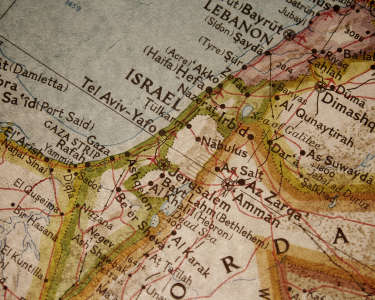Who Owns the Land?
 Today’s Palestinian-Israeli conflict can be reduced to one basic question: Who owns the land? To the Arabs, it was illegally seized from them after World War II by pro-Israel international governing bodies. To the Jewish people, however, the territory has always been rightfully theirs and was given to them by almighty God Himself.
Today’s Palestinian-Israeli conflict can be reduced to one basic question: Who owns the land? To the Arabs, it was illegally seized from them after World War II by pro-Israel international governing bodies. To the Jewish people, however, the territory has always been rightfully theirs and was given to them by almighty God Himself.
The three great religions of the world—Judaism, Christianity and Islam—were all birthed in the Middle East and share one common denominator. They trace their lineage to Abraham.
Once, when I was in Jerusalem, I was introduced to a woman who was passionate about building financial support for Jewish settlements all over Israel—including the West Bank (biblically known as Judea and Samaria). She told me in no uncertain terms, “This is our land. God gave it to us, and we don’t really care what politicians think or say. It will never change.”
This is the sentiment of untold thousands of Jewish people who have settled in Israel—including biblical Judea and Samaria—and do not have the slightest intention of living elsewhere. The Bible says the Lord made a covenant with Abram, saying: ‘To your descendants I have given this land, from the river of Egypt to the great river, the River Euphrates” (Genesis 15:18).
Out of Egypt
From the very start, Abraham knew the journey ahead would be filled with both anguish and achievements. For example, the Lord told him in advance the children of Israel would spend 400 years in captivity before being set free. God said, “Know certainly that your descendants will be strangers in a land that is not theirs, and will serve them, and they will afflict them four hundred years. And also that nation whom they serve I will judge; afterward they shall come out with great possessions” (Genesis 15:13-14).
This prophecy came true when the Almighty sent ten plagues upon Egypt and a frightened pharaoh liberated the Israelites from bondage. As Moses led the great Exodus, they were carrying with them the wealth of the land—silver, gold, and clothing. (See Exodus 12:35-36.) During their wanderings, God gave Moses the Ten Commandments, built the Ark of the Covenant, and ordained specific rules for living and patterns of worship held sacred by Jewish people to this very day.
A Promise of Possession
The reason the Exodus is such a significant and revered part of Jewish history is because the Israelites were headed toward the Promised Land—the same territory that God earlier pledged to Abraham.
Near the end of their journey, Moses told the people that God would give to them the land that Abraham, Isaac, and Jacob had possessed and that they would prosper in that land even more greatly than their forefathers had (see Deuteronomy 30:5).
After Moses died and Joshua was about to enter the land of Canaan (which would become Israel and then renamed “Palestine” by the Roman emperor Hadrian in A.D. 135 in an attempt to suppress Jewish identification with the land), the promise was repeated. The Lord declared to Joshua:
“Moses My servant is dead. Now therefore, arise, go over this Jordan, you and all this people, to the land which I am giving to them—the children of Israel. Every place that the sole of your foot will tread upon I have given you, as I said to Moses. From the wilderness and this Lebanon as far as the great river, the River Euphrates, all the land of the Hittites, and to the Great Sea toward the going down of the sun, shall be your territory” (Joshua 1:2-4).
This possession of the land did not happen overnight. The Bible records battle after battle—Jericho, Ai, and Gibeon, to name just a few. Eventually, the conquered territory was parceled out among the tribes of Israel. Yet to this day, Jewish people still await the fulfillment of the entire promise.














































